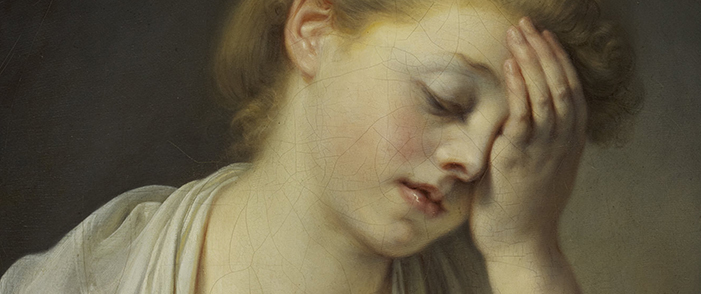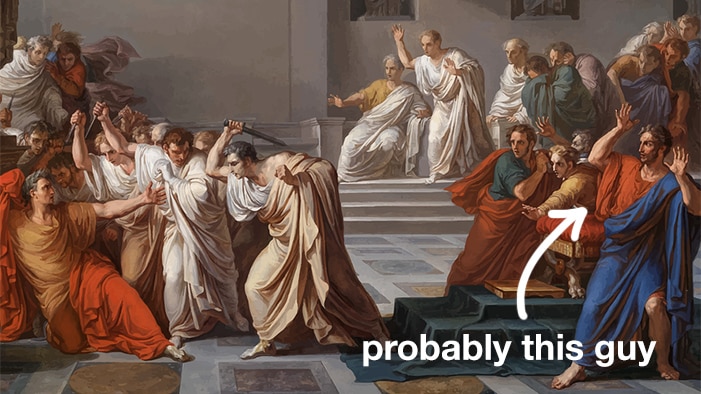Blogging The Odyssey: Part 10 (How to Tell If You’re About to Die in a Greek Epic)

Last time on Blogging The Odyssey, Odysseus was reunited with Telemachus, and it felt so good.
Sometimes foreshadowing is subtle. Other times it is more like a very large man screaming “DEATH IS COMING” right in your face, and you can either 1) fight back, 2) accept it, or 3) just ignore it completely. Generally, I’m a big fan of ignoring it completely. That’s actually how I deal with most of my problems, including but not limited to:
- Deadlines
- Tooth pain
- Literary devices that foretell a coming disaster
But Penelope’s evil suitors are not ignoring the doom signs so much as they are just completely unaware that they exist. Fate is about to serve up a big heaping slice of retribution pie, and no one has a clue. I would never want any of you to be caught so unawares. Should you ever find yourself in a Greek epic, here’s how you can tell if things are about to go sideways for you:
Book 18: The Beggar-King of Ithaca
Sign #1: A homely beggar takes up residence in your royal hall, and it soon becomes clear that there’s more to him than meets the eye. Odysseus finds himself challenged to a fight by another beggar. The suitors gather round, excited by the prospect of two homeless men duking it out for food.
Odysseus is like
 Wikimedia Commons
Wikimedia Commons
“Great, now I have to kick this guy’s ass. WHY WAS I CURSED WITH THE BURDEN OF SUCH A POWERFUL AND GLORIOUS BODY?”
I wish I could say I was exaggerating this point for comedic effect, but when he throws off his rags to fight, someone literally says, “Look at the hams on that old-timer!” Turns out he’s not just a scrawny hobo after all.
Here, the narrator also refers to him as a “foxy veteran.” I have nothing significant to say about this, I just wanted to make a note of it.
Odysseus punches the guy in the face and throws him out of the castle. The suitors shower him with food, and Amphinomous, who you’ll remember is less terrible than the others, congratulates him sincerely. This brings us to…
Sign #2: Someone straight-up tells you that a bloodbath is coming. Odysseus takes a liking to this Amphinomous fellow. He pulls him aside and says, “Look, I have a feeling Odysseus is coming back soon. He might even be HERE, IN OUR VERY MIDST. HE’S GOING TO SLAUGHTER THE MASSES. THE RECKONING IS NIGH. SAVE YOURSELF AND GO, YOU DUMB IDIOT.” But Amphinomous doesn’t go. He is “fraught with grave forebodings,” sure, but like what are the odds of any of that happening?
Besides, unbeknownst to him, he’s already been marked for death by Athena.
Book 19: Penelope and Her Guest
Sign #3: The weapons have mysteriously disappeared. At night, Odysseus, Telemachus, and Athena hide all the swords and shields so that the suitors will be defenseless come Murder Time. Penelope then approaches Odysseus, though of course she still doesn’t know it’s him. All she knows is that he’s a beggar who claims to have once met her husband. She questions him, and Odysseus gives such a stirring account of his own character that Penelope weeps. Basically:
ODYSSEUS: I met your husband once.
PENELOPE: Prove it.
ODYSSEUS: He’s tremendously sexy and he wears a purple cape, sometimes.
PENELOPE: THAT’S HIM.
 YouTube
YouTube
In gratitude, Penelope offers the beggar hospitality. Odysseus says he’s cool with this, but he tells her not to let any of the women touch his feet… unless they’re very old. Out of context, this very specific directive is both hilarious and confusing. It makes sense a few stanzas later, however—the old nurse Eurycleia comes in to wash his feet, recognizes a scar Odysseus sustained while hunting as a child, and recognizes him immediately. He swears her to secrecy, and she agrees not to tell a soul.
Sign #4: Someone is having very obvious prophetic dreams. Penelope tells Odysseus about a dream she had recently but which she cannot possibly parse for significance. In it, a talking eagle who claimed to be her husband swooped in and killed a bunch of geese said to be her suitors. BUT WHAT COULD IT MEAN?
Book 20: Portents Gather
Penelope knows she must get rid of the suitors so that Telemachus can reclaim what’s rightfully his. At Athena’s suggestion, she decides to remarry, though it causes her terrible anguish. To determine who’s most worthy, she’ll set up twelve axes in a row, and she’ll marry whoever can shoot an arrow through the holes of all twelve. This is how every marriage dispute should be settled, I think: with a winner-take-all prize fight in the Thunderdome. That said…
Sign #5: Eagles keep flying by, all ominous-like. The suitors arrive in the royal hall for breakfast. They’re plotting once again to kill Telemachus, and as they do so, an eagle zips past with a struggling dove in its talons. This is the third time that’s happened, I believe. Everyone’s acting as if this is a totally normal amount of times to have seen eagles swooping around with death in their eyes.
But even if you can find it within yourself to disregard the death eagles, you couldn’t possibly miss this final portent of imminent catastrophe. Right? Right?
Sign #6: A prophet actually, literally tells you the walls are oozing blood. You know what? I give up. If we’ve reached the point where a well-known soothsayer is having visions of bleeding walls, inexplicable mist, and darkness blotting out the sun, and you’re still thinking, “Yes, I should definitely keep doing the things that I’m doing,” then I can’t help you. You’re on your own.
Predictably, nobody listens to Theoclymenus, the soothsayer in question. In fact, the suitors laugh him out of the palace. He basically says, “ENJOY THE RIVER STYX, YOU WITLESS FOOLS. TELL PERSEPHONE I SAID HI,” and books it. Smart man.
We’ve got four chapters left, guys. Can anyone hear The Rains of Castamere? Is it just me?
Discussion questions:
- “Look at the hams on that old-timer!” is something I’m going to start slipping into casual conversation. Who’s with me?
- I think I have seen maybe two eagles in my life. You?
- In these chapters, Athena holds all the cards. She promises Odysseus she’ll be at his side when he battles the suitors; she prompts Penelope to make a decision; she even forces the suitors to be super obnoxious so Odysseus will want to kill them even harder. In a world where mortals are merely cosmic playthings to the gods, can there be such a thing as free will?
Looking for the rest of our Blogging the Classics series? Check it out here! For all of Blogging The Odyssey, click here!















